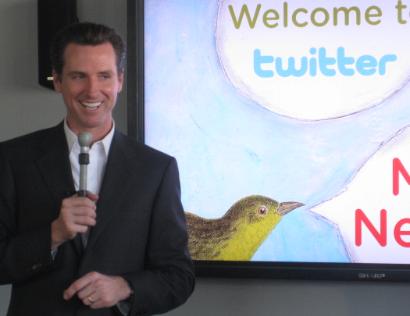Candidate “Tweets” Run for California Governorship
By Liz Herrin In Industry News, Social Networking
Newsom’s time in office was also marked by a turbulent personal life. He not only admitted abuses of alcohol, but he also admitted an affair with the wife of his campaign manager (and personal friend).
Despite these personal difficulties, Newsom announced on April 21, 2009 that he was throwing his hat into the ring for the California governorship. And while no one was particularly surprised by the move—there were few to no attempts to hide his ambitions towards higher offices—people are abuzz about the method by which he announced this candidacy.
Updating his Twitter account, Newsom wrote: “It’s official — running for Gov of CA. Wanted you to be the first to know. Need your help.” This makes Newsom the first candidate to announce his political contention via Twitter.
This initial use of Twitter is indicative of the kind of campaign Newsom looks to run. It will be a technology-minded platform with an emphasis on new means of communication and interaction. With the simple act of using Twitter, Newsom placed himself in opposition to the old political school of thought and ingratiated himself with the younger, fresher political crowd.
And while this marks the first campaign kicked off with Twitter, Newsom is certainly not the first politician to utilize the micro-blogging site. Rather, the democratic side of 2008’s presidential campaign saw the frequent use of Twitter. Both Barack Obama and Hillary Clinton utilized the tool to varying success.
To that end, many considered Clinton’s attempts at tweeting to be too tightly controlled and regulated. For many, it felt like old politics dressed up in a new platform. Obama, on the other hand, gained an impressive following through his Twitter account.
All this seems to point to the overarching idea that successful political campaigns are not just about using new forms of communication. It’s about changing the way politicians interact with their political bases. Old school politics were dominated by one-way conversations; the politicians communicated to the general public. But new school politics is about discussion and interaction. That’s why social media and social networking sites are so groundbreaking in the political field. They call upon user action, interaction, and response.
Newsom’s tweet concluded with, “Need your help.” This is not a statement. It’s a simple call to action. This kind of mentality change puts some of the power back into the hands of the constituents—even if that power shift is imagined or manufactured.
The personal mistakes and indiscretions in Newsom’s past might just hinder his chances at winning the governor’s seat, but regardless, he’s indicative of the new generation of politician. A more human figure, this new politician is open to discussion and interaction with people other than his advisors and campaign managers, and he’s adaptable to new ideas—at least, that’s what his Facebook account says.


No Comment